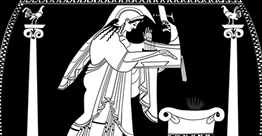
Gregory Nagy
Gregory Nagy is the Francis Jones Professor of Classical Greek Literature and Professor of Comparative Literature at Harvard University, and is the Director of the Center for Hellenic Studies, Washington, DC. In his publications, he has pioneered an approach to Greek literature that integrates diachronic and synchronic perspectives. His books include The Best of the Achaeans: Concepts of the Hero in Archaic Greek Poetry (Johns Hopkins University Press), which won the Goodwin Award of Merit, American Philological Association, in 1982; also Pindar's Homer: The Lyric Possession of an Epic Past (Baltimore: Johns Hopkins University Press, 1990), Poetry as Performance: Homer and Beyond (Cambridge: Cambridge University Press, 1996), Homeric Questions (Austin: University of Texas Press, 1996), Homeric Responses (Austin: University of Texas Press, 2003), Homer’s Text and Language (University of Illinois Press 2004), Homer the Classic (Harvard University Press, online 2008, print 2009), and Homer the Preclassic (University of California Press 2010). He co-edited with Stephen A. Mitchell the 40th anniversary second edition of Albert Lord’s The Singer of Tales (Harvard Studies in Comparative Literature vol. 24; Harvard University Press, 2000), co-authoring with Mitchell the new Introduction, pp. vii-xxix.
Professor Nagy has taught versions of this course to Harvard College undergraduates and Harvard Extension School students for over thirty-five years. Throughout his career Nagy has been a consistently strong advocate for the use of information technology in both teaching and research. Besides teaching at the Harvard campus in Cambridge, MA, Nagy is also the Director of Harvard's Center for Hellenic Studies in Washington, D.C.
Board of Readers and Course Staff

Leonard Muellner, Chair of the Board of Readers
Leonard Muellner is Professor of Classical Studies, Brandeis University (Waltham, MA, USA) and Director for IT and Publications, Center for Hellenic Studies (Washington, DC). Educated at Harvard University (Ph.D. 1973), his scholarly interests center on Homeric epic, with special interests in historical linguistics, anthropological approaches to the study of myth, and the poetics of oral traditional poetry. His recent work includes "Grieving Achilles," in Homeric Contexts: Neoanalysis and the Interpretation of Oral Poetry, ed. A. Rengakos, F. Montanari, and C. Tsagalis, Trends in Classics, Supplementary Volume 12, Berlin, 2012, pp. 187-210, and “Homeric Anger Revisited,” Classics@ Issue 9: Defense Mechanisms, Center for Hellenic Studies, Washington, DC, September, 2011.

Kevin McGrath, Vice Chair of the Board of Readers
Kevin McGrath is an Associate of the Department of South Asian Studies at Harvard University. His research centers on the Sanskrit epic Mahabharata, and he has published four works on this topic: The Sanskrit Hero, Stri, Jaya, and Heroic Krsna, and is presently concluding a study of epic kingship and preliteracy. McGrath is Poet in Residence at Lowell House and his most recent publications are Eroica and Supernature, which are both I-books. He does fieldwork in the Kacch of Western Gujarat, studying kinship, landscape, and migration. The hero as a figure for humanistic analysis is the focus of much of McGrath's scholarly work, particularly as expressed in the poetry of Bronze Age preliterate and premonetary culture.

Alex Forte, Honorary Vice Chair
Alex Forte is a PhD Candidate in the department of the Classics at Harvard University. His primary research topics are the reception of Indo-European poetics in archaic Greek poetry, and inter/intratextuality in Neronian literature. He is also interested in the intellectual history of Rationalism.

Claudia Filos, Editor of Content and Social Media
Claudia Filos holds an MA from Brandeis University and is the Assistant Editor of Online Publications for the Center for Hellenic Studies in Washington, D.C. Her thesis is titled "Steadfast in a Multiform Tradition: ἔμπεδος and ἀσφαλής in Homer and Beyond". Her teaching and research interests include Homer, oral poetics, the cult of saints, and comparative work on the reception of classical themes and diction during late antiquity and the romantic period. She is committed to improving opportunities for meaningful research by undergraduates and nontraditional scholars and to promoting the study of classical languages and literature outside the university setting.

Natasha Bershadsky, Multimedia Editor
Natasha Bershadsky recently received her PhD degree from the University of Chicago. Her thesis, Pushing the Boundaries of Myth: Transformations of Ancient Border Wars in Archaic and Classical Greece, explores the interconnections of history, myth, ritual and politics. She is also interested in the Greek perception of poet as a hero, and the reverberations of this idea in the later conceptions of the figure of author in poetry and fiction. Her publications include "The Unbreakable Shield: Thematics of Sakos and Aspis," Classical Philology 105 (2010): 1–24, and "A Picnic, a Tomb and a Crow: Hesiod's Cult in the Works and Days," Harvard Studies in Classical Philology 106 (2011) 1–45.

Glynnis Fawkes, Visual Reader
Glynnis Fawkes holds a joint MFA from the School of the Museum of Fine Arts (Boston) and Tufts University. Her paintings and cartoons have been exhibited internationally, and she has worked extensively as illustrator on archaeological projects in Greece, Cyprus, Turkey, Lebanon, and Israel. A Fulbright Fellowship to Cyprus allowed her to publish a book of paintings Archaeology Lives in Cyprus (Hellenic Bank, Nicosia 2001) and Cartoons of Cyprus (Moufflon Publications, Nicosia, 2001). She teaches a course in Making Comics at the University of Vermont, and was named among the Best American Comics Notables in 2012. Her drawings for the Homeric Hymns seek to bring out the humor and pathos of the interactions between men and women, humans and gods. Her work may be seen at http://glynnisfawkes.com/.

Sean Signore, Reader
Sean Signore holds an MA in Classics from the University of Georgia. His thesis is entitled "Achilles and Andromache: Gender Ambiguity in Motif, Narrative, and Formula." His research focuses on how historical linguistics and oral poetics complement the study of the Homeric epics. Further interests include etymology, the reception of Homer in Archaic and Golden Age Latin, and comparative work with Indic and Chinese literature.

